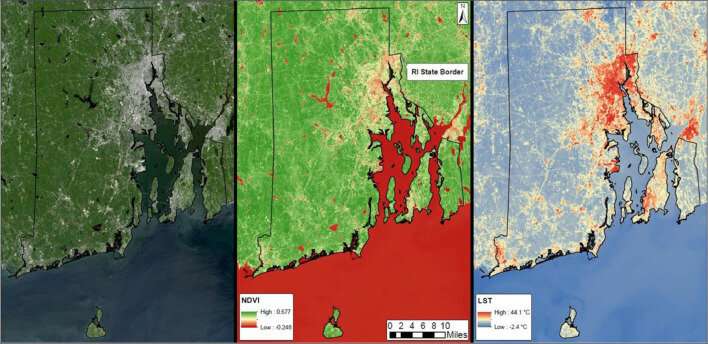Assessment of urban water-energy interactions and heat island signatures in Rhode Island

A study of the urban heat island effect that warms Rhode Island focused on the connections between water and energy use, which could lead to better understanding and mitigation of the effect there and in similar urban areas as the global climate warms. Ali Akanda and colleagues at the University of Rhode Island describe their findings in an article in the open access journal Energy Nexus.
Buildings, roads, transportation systems and other urban infrastructure can cause heat island effects that raise temperatures by 1 to 12°C compared to surrounding open countryside. Rhode Island's urbanized areas, which house more than 90% of the state's citizens, generally experience temperatures around 4°C higher than rural areas. About 48% of the state's population lives in areas where temperatures often exceed 25°C, bringing risk of heat stress and significant health implications, which are expected to grow more serious in future.
The researchers studied the interconnections between the region's heat island effect and water and energy use with a method called an Urban-Water-Energy-Nexus approach. This allowed them to quantify the extent and exposure of urban heat island effects at high resolution.
Some of the interconnections are obvious, such as increased energy demand for air conditioning, but the research also points to less direct effects including increased smog formation and deteriorating air quality. The impacts range from multi-faceted rising residential energy demand to impaired water quality and easier transmission of water-borne pathogens, such as salmonella or cholera.
In 2020, Rhode Island experienced an extreme drought, adding urgency to attempts to quantify the heat island effect and consider strategies for mitigating its most serious consequences.
The researchers hope that their study will help guide the state-wide land and water resources management planning crucial to sustaining an acceptable quality of life. Their work could also inform similar studies of other urban areas in the U.S. and beyond.
More information: Fabian Wagner et al, Assessment of Urban Water-Energy Interactions and Heat Island Signatures in Rhode Island, Energy Nexus (2022). DOI: 10.1016/j.nexus.2022.100093
Provided by Springer


















